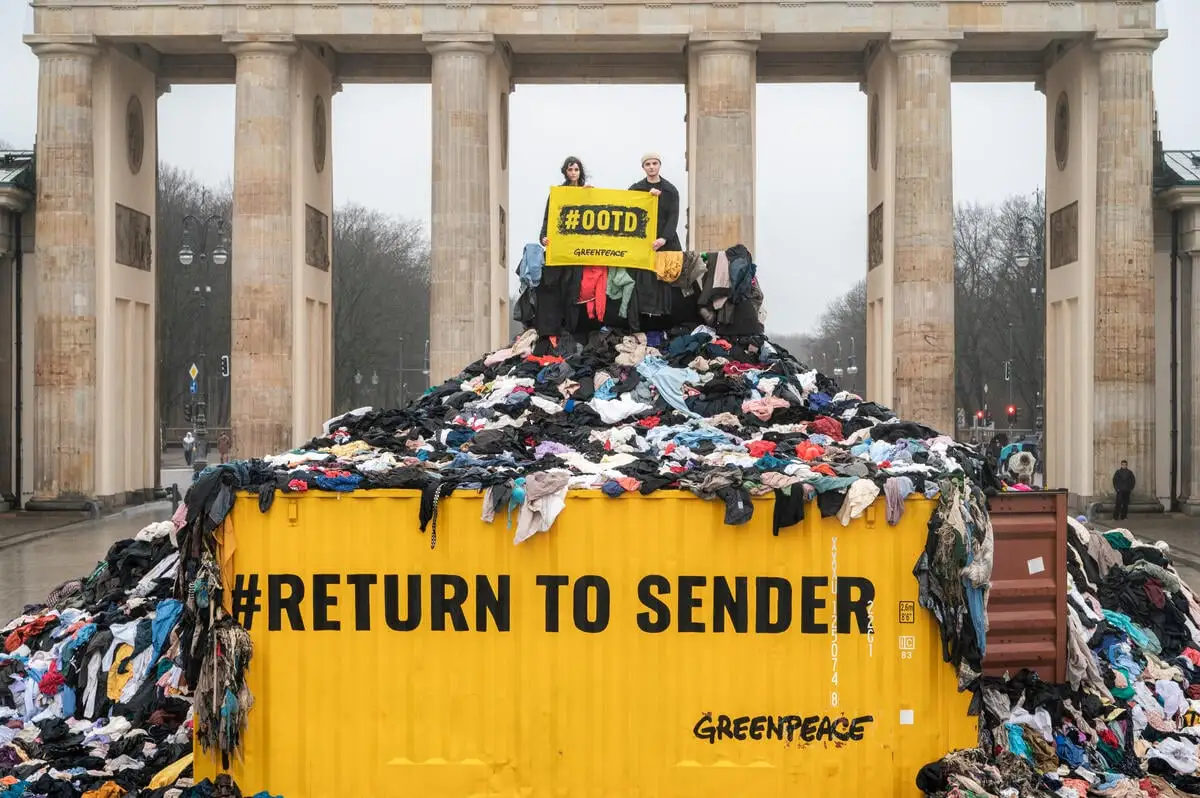This story was originally posted by Greenpeace Africa.
For several years now, my country Ghana has been dealing with a silent plague: second-hand clothes. Behind its booming cocoa industry, vibrant culture and delicious food, this plague is choking our water bodies and toxifying our land. Why do I call them a plague? Because of the huge volumes of Western exports of discarded fast fashion.
Ghana was once declared home to the world’s largest electronic waste dump, due to the tonnes of e-waste being dumped into the country. But many are not aware of the further burdens that wealthy countries, especially in Europe and North America, continue to place on us.
For those reading this and living in the West, have you ever considered what actually happens to your clothing when you donate them? And do you assume donations end up in your home town or city? Well to answer that question – a lot of it comes to cities in Africa like Accra, flooding our flea markets before choking our rivers and lagoons, polluting our beaches and destroying marine life in our ocean – places they really shouldn’t be.
Second-hand clothes have long been important to Ghana’s local economy. Kantamanto market in Accra, established in the 1970s, is one of the largest second-hand markets in the world, with over 30,000 workers who sell, clean, repair and upcycle the Global North’s textile waste. But the growth of fast fashion since the 2000’s has led to increasing quantities of poorer quality clothing, and overproduced fast fashion arriving in overwhelming volumes. Ghana now receives an annual total of about 152,600 tonnes of second-hand clothes, known as Oburoni Wawu, literally translated as “dead white man’s clothes”. Every week, around 100 forty foot long containers, filled with over 15 million fashion items, arrive in the port of Tema, Ghana’s largest port, east of Accra. About 70% of these clothes are sent to Kantamanto market.
In October 2023, Greenpeace Africa and I joined forces with our colleagues at Greenpeace Germany on a research trip to document the situation in Ghana. Our aim was simple – to find out from local communities how this impacts their lives, how they feel about the vast quantities of used clothes being imported and to intervene by bringing just a small proportion of these clothes back to Europe – where they belong.
Our journey began in Old Fadama, Accra’s biggest informal settlement in Accra with over 80,000 inhabitants and home to a large and growing dumpsite. The mountains of clothes were huge. The smell was potent. And climbing to the top of them felt like standing on the monuments of our overconsumption – a harsh reminder of the fashion industry’s contribution to climate colonialism.



And I do agree with that, fast fashion is a big plastic pollutiony problem. Not to mention the carbon to ship garbage across the world. But when charities say “hey donate your clothes please we are going to help needy people :)” I feel they are obligated to make that donation something beneficial. I mean they are literally asking for this stuff, they have no reason not to be prepared to deal with it properly. The landfill may well be a better option, but there are also some clothes recyclers that shred it up into fiber for things
I have not seen any that are begging for clothes as if they are completely out of clothes. More of a “we accept donation in the form of …” And then list of things, one of which is clothes. As in, if you are going to get rid of your clothes, bring them here and we can put them to good use. Textile recyclers have cropped up as a response to this and are helping tremendously, a lot of people just do not know about them as much yet. They even take items that people wouldn’t even think to take for donation, like of towels and wash cloths, under garments, etc. some municipalities (for example, the one I live in) require residents to compost and textile recycle with the city facility and those items are not allowed in the landfill.